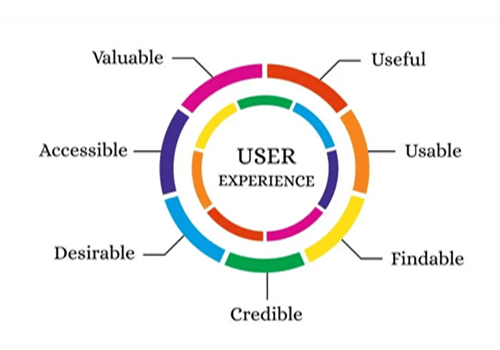Influence of site (UX) on rankings
We will take a closer look at how User Experience (UX) affects website rankings. We’ll cover things like making websites easy to find, keeping people interested, building trust, and how fast pages load, all of which can help websites do better in search results.
What is UX (User Experience)
UX design involves a deep understanding of the people who will be using a product or service. Designers study how users interact with technology, what they expect from it, and what frustrates them. By gathering this information, designers can create interfaces and experiences that are mindful, easy to use, and even enjoyable.
Everything from the layout of a website to the tactile feel of a button when it’s clicked can be involved in this. Ultimately, the goal of UX design is to make sure that people have a positive and fulfilling experience when they use a product or service, which in turn can lead to greater customer satisfaction and loyalty.

Why is UX important for websites
UX is important for websites because it directly affects how users feel when they visit a site. A good user experience means visitors are happy and can easily find what they need.
This can lead to more people using the site, better sales, and a positive impression of the brand. Essentially, it’s about making the website easy and enjoyable to use for everyone.
The Relationship Between UX and SEO
The connection between Search Engine Optimization (SEO) and User Experience (UX) is important for the success of any online venture. UX aims to ensure a positive experience for website visitors, while SEO strives to enhance a website’s visibility in search engine results.
When UX and SEO work together, they can enhance a website’s performance by providing valuable content in a user-friendly manner, ultimately leading to better search engine rankings and increased user satisfaction.
The Impact of Search Engine Rankings on Website Visibility and Traffic
When a website ranks higher in search engine results, it is more likely to be seen by people searching for relevant information, products, or services. This increased visibility can lead to more clicks and visits to the website, as users often trust and click on the top results. As a result, higher search engine rankings can have a significant effect on the amount of traffic a website receives.
More traffic can translate to more potential customers, readers, or users engaging with the website’s content or offerings. Therefore, search engine rankings play a crucial role in determining a website’s visibility and the level of traffic it attracts, ultimately influencing its success and reach.
The Impact of UX on Search Engine Rankings
Search engines like Google care about how easy and enjoyable a website is to use. They want to show people websites that are helpful and work well. So, they look at things like how fast a page loads, if it works well on mobile, and if it’s easy to use.
Websites that offer a good user experience and are easy to use are likelier to rank higher in search results. This is because search engines want to send people to websites that are useful and trustworthy. A positive user experience can contribute to a website achieving a higher ranking in search engines such as Google.
The Relationship Between Good UX and Higher Search Engine Rankings
When a website offers a positive user experience, it tends to rank higher in search results. Factors such as fast page loading, mobile-friendliness, relevant content, and user engagement contribute to this. Search engines prioritize websites that are easy to use, load quickly, and provide valuable content. Responsive design, which allows a website to adapt to different screen sizes, is also crucial.
Additionally, search engines analyze the relevance and quality of a website’s content to determine its ranking. Websites that offer valuable and relevant content to users are more likely to rank higher in search results. Good UX directly impacts a website’s visibility and performance in search engine rankings.
Factors Influencing Site UX and Rankings
Here are the key factors that influence site UX (User Experience) and rankings:
- Site Structure with Easier Navigation: A well-organized site structure and easy navigation are crucial for a positive user experience. Users need to be able to find the information quickly and easily they require.
- Usability: Websites that are user-friendly and intuitive tend to have better UX and rankings. This includes clear and concise content, easy-to-use forms, and logical placement of elements.
- Consistency: Consistency in design, layout, and branding across the website helps users navigate and understand the site better. It creates a cohesive and professional user experience.
- Security: Website security is essential for building trust with users. Implementing SSL certificates, protecting user data, and ensuring secure transactions contribute to a positive user experience.
- Accessibility: Ensuring websites are accessible to all users, including those with disabilities, is essential. Incorporating accessibility features like alt tags for images, appropriate heading structure, and keyboard navigation can enhance both user experience and search engine rankings.
- Content quality: Good content makes people happy and helps websites do better in search results. When the stuff on a website is interesting, well-written, and helpful, it makes people like the website more. This includes things like accurate information, well-written articles, and cool pictures or videos. Search engines like websites with good content because they want to show people the best stuff.

User Engagement Metrics and Rankings
User engagement metrics, such as time on site, bounce rate, and pages per session, play an important role in determining website rankings.
Time on site
When users spend a longer average time on a website, it indicates a positive user experience (UX). Here’s how a longer time on site can improve rankings:
- Positive UX: A longer time on site suggests that users are finding the website valuable, engaging, and relevant to their needs.
- Lower bounce rate: When users spend more time on a website, the bounce rate decreases, indicating their interest. Search engines view a lower bounce rate positively.
- Improved rankings: Longer time on site lowers bounce rate, showing user interest. Search engines see lower bounce rate as positive signal for user engagement.
Bounce Rate
Bounce rate is a metric that measures the percentage of visitors who leave a website after viewing only one page. Here’s how a lower bounce rate can lead to better rankings:
- Engaging and relevant content: Lower bounce rate means users find website content interesting and relevant, meeting their expectations. Search engines value user satisfaction and consider lower bounce rates for rankings.
- Higher user engagement: Greater user engagement, such as prolonged time spent on the site and interaction, reduces bounce rate, indicating a positive user experience. Search engines value user engagement for better rankings.
Pages per session
Pages per session is a metric that measures the average number of pages a user views during a single visit to a website.
- Deeper engagement: when people click through different pages on a website, it shows that they are actively looking at the content. This can make search engines like Google think the website is valuable, which could help it show up higher in search results.
- Increased time on site: Users spending more time and navigating through multiple pages reinforce positive experience, potentially leading to improved search rankings.

Amazon One-Click Purchase
This is arguably the most famous example of Amazon optimizing checkout for faster conversions. They introduced a one-click purchase in 1999, allowing users to buy with a single click if their payment and shipping information is pre-saved. This significantly reduced friction in the checkout process and led to a 60% increase in sales.
Conclusion
Making websites easy to use is important for getting a good ranking on search engines. Focusing on UX can drive organic traffic and increase website visibility.
Making websites easy to use and making sure they show up well in search results is important for any online site to succeed. The way the internet is changing, it is important that websites have good content and present it in a way that’s easy for people to use on different devices and platforms.


